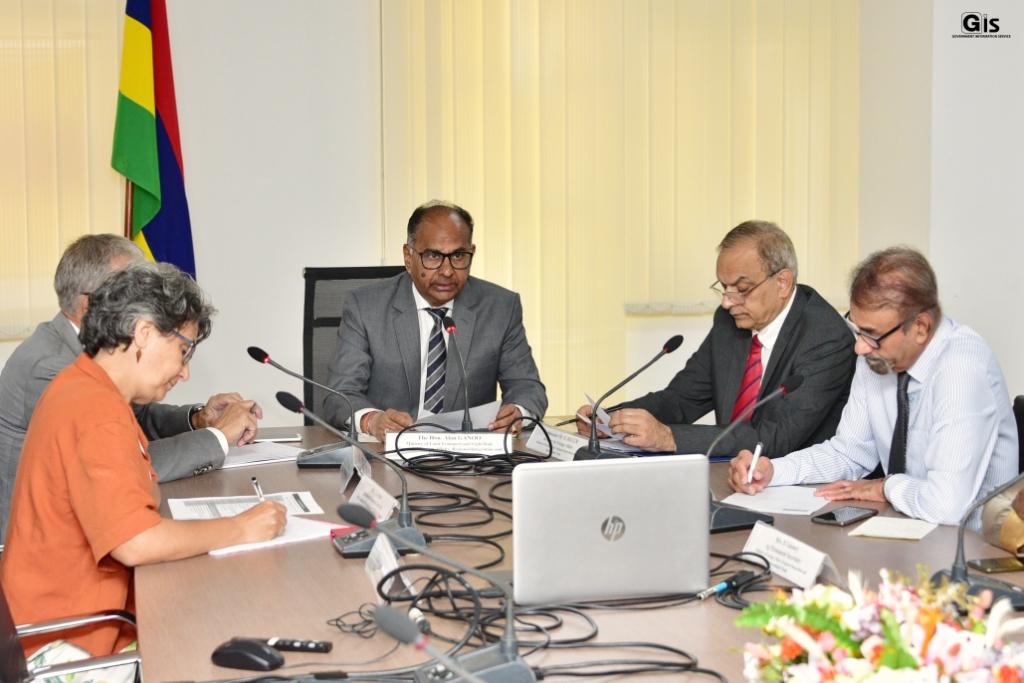Africa-Press – Mauritius. A five-day workshop on “Processing applications for Geographical Indications” (GI) aimed at providing assistance to Mauritius to build the capacity of relevant Ministries and Departments to process applications for GIs, opened, this morning, in Port Louis, in the presence of the Minister of Land Transport and Light Rail, Minister of Foreign Affairs, Regional Integration and International Trade, Mr Alan Ganoo, and the Ambassador and Head of Delegation of the European Union (EU) to Mauritius and Seychelles, Mr Vincent Degert.
The workshop is a joint initiative of the Ministry of Foreign Affairs, Regional Integration and International Trade, the Industrial Property Office of Mauritius (IPOM), and the EU.
Some 40 operators of the economy are participating. The capacity building programme will provide insights on the assessment of the direct link between a GI product and its geographical area or territory of origin. It will cover the draft manual of procedures prepared by the IPOM, GI procedures, legal and industrial property issues, GI controls and standards.
In his address, Minister Ganoo commended the EU Delegation and the Technical Assistance and Information Exchange Instrument of the EU for relentlessly supporting the Government of Mauritius, over the years, in the field of industrial property such as the conducting of the EU-funded long-term training on various parts of the Industrial Property (IP) Act 2019 which was carried out over a five-month period ending, ending March 2022.
Speaking about an operative legislation on GIs for Mauritius, he indicated that a comprehensive Industrial Property Act was proclaimed on 31 January 2022 with a view to revamping the laws on IP and to provide for an enhanced institutional framework to administer the industrial property legislation.
The law, he said, is now effective and it includes a component on GIs. He underlined the need to master this new element to operationalise this part of the IP Act, especially in terms of registration of GI rights from local operators as well as from foreign ones who wish to register a GI in Mauritius.
He recalled that studies pertaining to GIs in Mauritius date back to 2010 with the study undertaken by Pr Michael Blakeney and Dr Thierry Coulet which identified a wide array of products as GI potential.
These include rum, Demerara sugar, Bois Chéri tea, café de Chamarel, Tai So litchi, ornamental and cut flowers and products from Rodrigues such as ‘piment Rodrigues’; ‘limon Rodrigues’; Baie Topaz red beans and honey.
In 2018, the EU expert, Mr Giovanni Galanti, highlighted that natural brown special sugar and rum are the most promising GIs in Mauritius, he said. Minister Ganoo further emphasised on the advantages of GI products.
According to him, nowadays consumers pay more and more attention to the geographical origin of products. They care about the quality of products and their specific characteristics attributable to their respective geographical area, which has become in many cases, sign of authenticity and long-term tradition, he added.
He moreover pointed out that the GI would allow product differentiation by enabling consumers to distinguish between products with geographical origin-based characteristics and others without those characteristics.
In this respect, Mauritian products protected by GIs will testify of the Mauritian savoir-faire, contribute to the development of nice markets, and lead to revenue generation and economic growth, he said.
Minister Ganoo appealed to all participants to create more awareness around GIs at the level of their respective industries to help propagate knowledge about GIs and emphasise on the importance and benefits of developing GIs.
Awareness programmes should focus on the benefits of GI-registration as an important marketing tool to promote exports of local products. Indeed, local products registered and commercialised as GIs will indeed improve export opportunities and enhance export revenue, he said.
For his part, Ambassador Degert recalled that a GI is a sign used on products that have a specific geographical origin and possess qualities or a reputation that are due to that origin.
He added that GIs are commonly known as quality-bound-to-origin products and that a registered GI enables the owners of the right to prevent its illegal use by a third party whose ‘similar’ product does not conform to the applicable standards set while protecting the GI.
He also dwelt on the advantages of GIs which are: it brings authenticity, diversity, and quality; it brings more revenues for producers; and ensures that jobs stay within the area of production. According to him, the Mauritian public will be receptive to GI products as people like to buy high quality products for their families.
For More News And Analysis About Mauritius Follow Africa-Press







